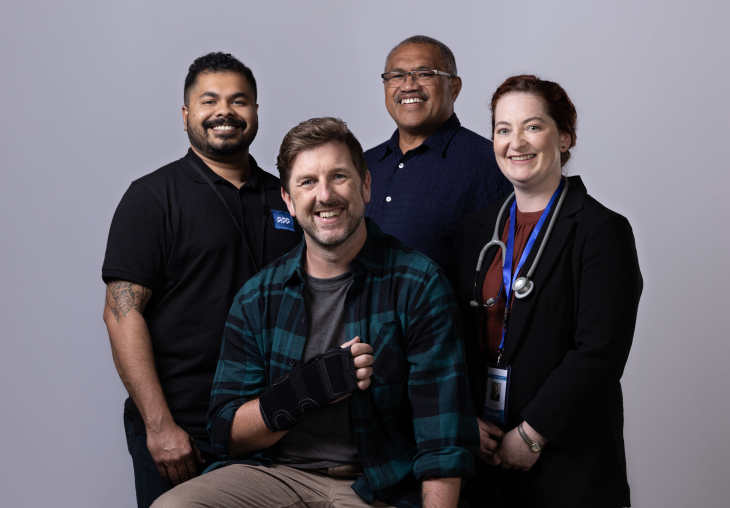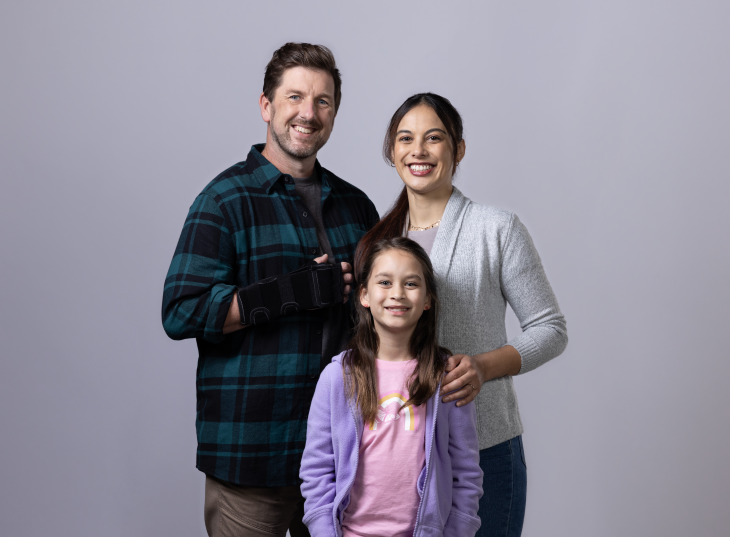How to make recovery at work a success
Video transcript for Teamwork makes recovery work
Visual
We see a large warehouse with a row of five chairs and a row of six stools behind them.
Cameron is sitting in the middle seat of the front row with his hand and wrist in a black brace.
Narrator
Unfortunately, injuries can happen. And that may mean that you’ll need some time off work while you recover. But evidence shows, getting back to it sooner and recovering at work has positive physical and mental health benefits.
Visual
Cameron’s boss comes in and gives Cam a fist-bump and a warm hug.
He sits next to him and puts a sign at Cam’s feet. It reads 'Cameron Bruce's Recovery Team'.
Narrator
You won’t be expected to do your usual job if you’re not up to it, but you could take on some different mahi that suits your condition, or even train and mentor others. And when you are ready, studies show that recovering at work means you’ll be much more likely to return to your old job than if you recovered at home.
Visual
Cam’s whānau also come and sit in the middle front row around him. There’s a young daughter and his partner. They exchange loving hugs and greet the boss warmly.
Two workmates come into the scene wearing their high-vis vest and helmets. They both say hello to Cam and stand behind him.
The boss hands Cam an iPad and lets him know there’s a couple of things to look at on it.
Cam’s health providers walk into the scene, his GP, Physio, and nurse. They say hi to Cam and check how he’s doing. They all stand in the row behind Cam.
Narrator
And because you’re working, we can top up what your employer contributes, so you could earn up to 100% of your pre-injury income.
Visual
Two ACC workers come into the scene, shake Cam’s hand and move into the back row.
Narrator
On top of that, there’s the positive physical and mental aspects of staying connected to your workplace. You’ll get out and about, spend time with your mates, maybe make some new ones who like to chat, and have something to get out of bed for, which all contribute to a better recovery.
Visual
A lady comes into the row behind Cam and gives Cam a warm hug.
An office worker walks into the scene. He squeezes into the row behind Cam to say hello to Cam and others in the group.
The GP helps the lady take her seat in the front row.
The lady offers Cam biscuit from her plate of biscuits
Narrator
It’s also good for employers. They get you back sooner to keep up productivity and have your skills and knowledge around the place. And it’s great for everyone else's morale to see an injured colleague get back to work.
Visual
Cam offers his daughter a biscuit.
A workmate gives Cam an update about work. Cam notes the update on his iPad.
The screen on the iPad shows a list of tasks. The heading on the screen changes from To Do to Done as Cam ticks the box to show the task is completed.
Two more workmates walk into the back row.
We see all the different people smiling and saying hello each other. A couple shake hands.
Narrator
But you can’t do it alone. You’ll need some help from everyone - doctors, physios, mates, whānau, and of course the boss.
Visual
One workmate reaches over to ruffle Cam’s hair to say hi.
The camera moves out to show the full group and everyone starts to settle, ready to take a photo.
We see the back of a photographer, about to take a photo.
Narrator
So take some time to find out more, and learn about your role on the team, because teamwork makes recovery work.
Visual
There’s a flash and then we see the ‘team photo’.
The boss looks at his watch and everyone starts to leave the scene and get back to work.
A graphic shows
Kia mahitahi, kia whakaora
Teamwork makes recovery work
We know recovering at work is good for an injured person’s physical and mental wellbeing, and helps them get better, sooner. So we’ve created an online hub on how to make recovery at work a success – for an injured person, employer or health professional.
Teamwork makes recovery work – an online hub on making recovery at work a success
We’re here to support New Zealanders to recover from injury following an accident, no matter where it happens – at work, home or during everyday life.
Being injured can send a ripple through a person’s life, including unexpected time off work. This can cause an increased level of stress and financial strain when recovery should be the main priority.
For businesses, having an employee off work unexpectedly can also be stressful. It can mean the loss of a key staff member and reduced productivity, while it can also impact team morale.
Evidence shows that, when done safely and appropriately, recovering at work after a non-complex injury can help people get better more quickly, and makes it more likely they will return to their job, as well as the things they enjoy outside of work.

The benefits of recovering at work
Recovering at work can be good for physical and mental wellbeing, provides structure and routine, a sense of purpose, and social connection to workmates – which all contribute to a better recovery.
With just some temporary adjustments, most injured people with non-complex injuries, like a sprain or strain, can recover safely at work.
It can also mean the injured person can earn up to 100 per cent of their pre-injury income, relieving the financial burden of recovery.
For employers, involvement in an employee’s recovery means retaining vital skills and knowledge. It also fosters a positive work environment, as well as helping to maintain a skilled and stable workforce.
To do it successfully takes a real team effort – including the injured person, their employer and their health provider, as well as the support of whānau and workmates, and ACC.
We’re here to help make recovery at work easier and have created a range of helpful online resources to help make recovery at work a success.
Learn more about what role you can play in recovery at work – whether you’re an injured worker, an employer, or a health provider.






